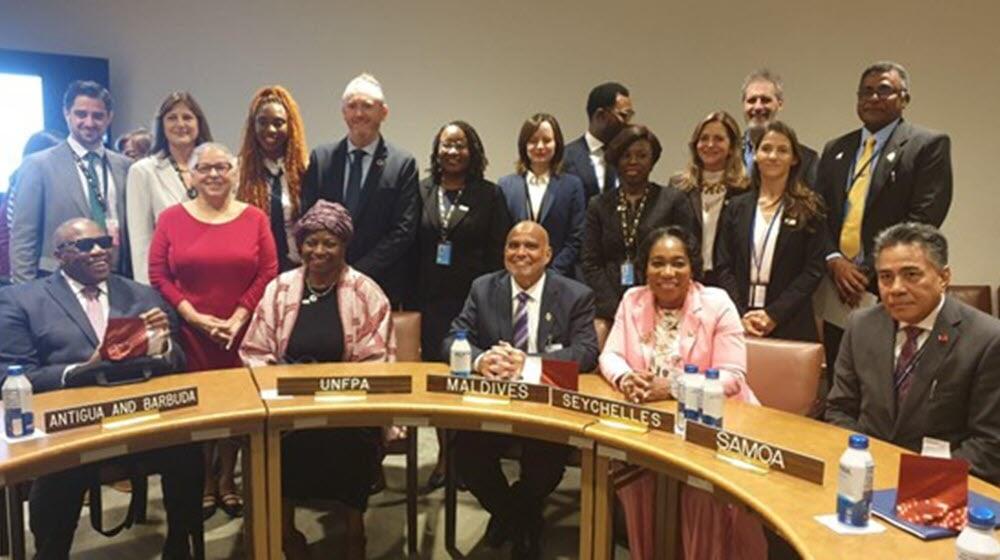UNITED NATIONS, New York – The UN Member States group of 12 Pacific Small Island Developing States - the “PSIDS” - are “aware that more is needed to be done to fully realize the promises of the International Conference on Population and Development (ICPD) Programme of Action. After three decades of implementation, PSIDS and other SIDS still remain a special case for sustainable development,” said the delegation of Vanuatu as the Chair of PSIDS during the recently concluded 57th Session of the UN Commission on Population and Development (CPD57). “The Pacific is renewing its commitment to the ICPD Programme of Action and further reaffirm our collective commitment,” the PSIDS stated, while calling on the international community’s continued attention and support to Pacific member states in addressing chronic and emerging humanitarian and development challenges including the negative effects of climate change.
At this year’s CPD held from 29 April to 3 May 2024 at the UN Headquarters in New York, Member States reviewed the status of the implementation of the ICPD Programme of Action (PoA) since it was adopted in 1994 and how it is contributing to the achievement of the current 2030 Agenda including the Sustainable Development Goals. The Commission adopted a declaration at the opening of the session, and commemorated the 30 years of the journey of the ICPD PoA.
The PSIDS’ statement as a group delivered by its Chair, Vanuatu Permanent Mission to the United Nations, also on behalf of Federated States of Micronesia, Fiji, Kiribati, Marshall Islands, Nauru, Palau, Papua New Guinea, Samoa, Solomon Islands, Tonga and Tuvalu, underscored the centrality of population and demographic issues in planning and financing for sustainable development.
In the last three decades since the landmark conference in 1994, small island countries in the Pacific have made constant strides in implementing the ICPD Programme of Action. “PSIDS have improved health sectors; however, most Pacific countries continue to experience a number of challenges, including constraints in funding and infrastructure for health, as well as workforce shortages in particular medical specialists including midwives, in addition to geographical remoteness, which makes access for rural and outer island communities difficult,” PSIDS said.
Recognizing that “gender equality, women's empowerment, and full realization of human rights of women and girls have a transformative and multiplier effect on sustainable development,” in the joint statement, the PSIDS expressed their collective commitment to reducing gender-based violence, adding that “eliminating all forms of discrimination and of violence against all women and girls, including inter alia by developing and implementing gender responsive action plans, contribute to socio-economic growth and development.”
The PSIDS also stressed the need for data and statistics both in quantity and quality to effectively monitor progress across social and economic development sectors. “Strengthening data collection, and accessing reliable, timely and real data, to measure progress are critical in achieving the promises of the ICPD Programme of Action and the 2030 Agenda.”
The small island countries in the Pacific also collectively requested the global community for distinct attention to be devoted to the sub-region. As one of the most significant issues that have emerged in the last 30 years since ICPD that is impacting sustainable development of the Pacific, the PSIDS group statement singled out “climate change,” reminding other UN Member States that “PSIDS are among those that contribute the least to global climate change, but are among those that both suffer the most and have the least capacity to adapt.”
The population of the Pacific are “particularly vulnerable to the adverse impacts of climate change, including, inter alia, erratic precipitation, increasingly frequent and extreme weather phenomena, more frequent and severe tropical cyclones, floods and drought, diminishing fresh-water resources, desertification, coastal erosion, land degradation and sea-level rise,” said the PSIDS, adding “these represent the gravest of threats to the survival and viability of our population, natural ecosystems, and overall sustainable development, and thus affecting PSIDS’ capacity to realize the promises of the ICPD Program of Action and the SDGs.”
“The Pacific member states’ active engagement at CPD57 was evidently visible, also through their active participation in various side events by high-level delegates,” said UNFPA Pacific Assistant Representative, Lorna Rolls, who accompanied Pacific member states’ delegations. The rest of the year 2024 also has many inter-governmental fora that are crucial for the Pacific small island countries, including the upcoming 4th International Conference on Small Island Developing States (SIDS4) at the end of this month from 27-30 May to be held in Antigua and Barbuda, and the UN Future of the Summit in September. Ms. Rolls emphasized “UNFPA stands ready to continue to assist Pacific SIDS in amplifying their voices globally about their unique needs and challenges faced, including by women and youth.”


